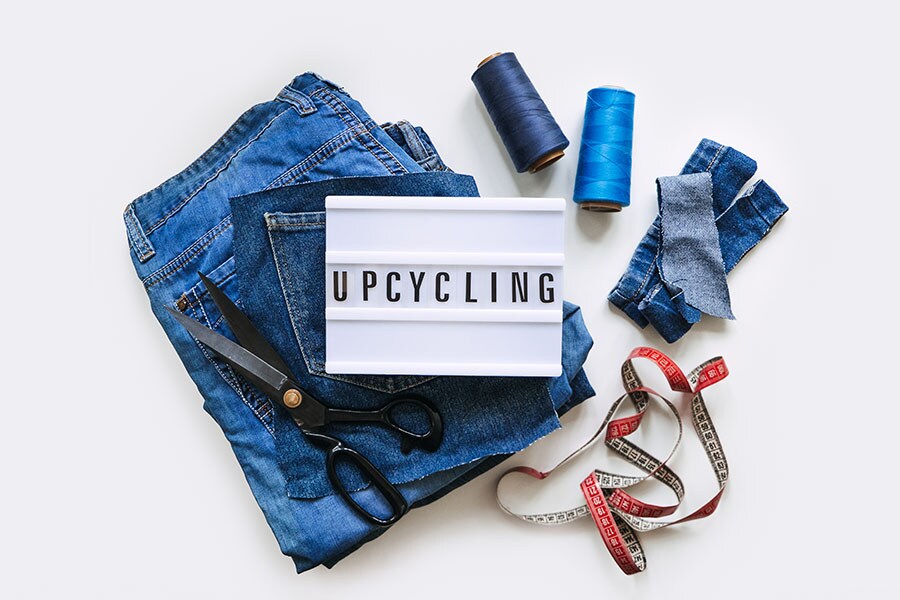
How upcycling is taking root in India
By AFPRelaxnews | Dec 20, 2022
From a potato chip packet, to used or broken furniture and objects, PET plastic, and food packaging, in India, the famous Lavoisier quote, "Nothing is lost, nothing is created, everything is transformed," is as relevant as ever today
 [CAPTION]Plastic, denim, food packaging, broken furniture and more is now being transformed into fabrics and clothing thanks to India's entrepreneurs. Image: Shutterstock [/CAPTION]
[CAPTION]Plastic, denim, food packaging, broken furniture and more is now being transformed into fabrics and clothing thanks to India's entrepreneurs. Image: Shutterstock [/CAPTION]
Just like second hand shopping and clothing repair, upcycling is now a serious alternative in the fight against waste and the mountains of trash that populate the planet. These practices are being adopted all around the world, and particularly in India, where creators and entrepreneurs are rolling out initiatives, each more innovative than the next.
_RSS_ From a potato chip packet, to used or broken furniture and objects, PET plastic, and food packaging, in India, the famous Lavoisier quote, "Nothing is lost, nothing is created, everything is transformed," is as relevant as ever today. Faced with environmental issues, more and more designers are launching into upcycling to recover waste and give it a second life in the form of clothing. And these initiatives highlight how waste and trash are some of the main obstacles to making fashion more virtuous.
Fighting plastic waste
Aged just 17 years old, and while still a student, Aditya Banger, originally from Bhilwara (Rajasthan), became an entrepreneur by starting to recycle plastic bottles and packaging to transform them into fabric. At the helm of a company called Trash to Treasure, which was created at the beginning of 2021 — in the midst of the Covid pandemic — he now recycles no less than 10 tonnes of plastic per day, in turn creating fabric that's sold to make clothing.
The concept was conceived and implemented to "[create] a better India by reconsidering the production chain and recycle all recoverable materials with economic and environmental benefits," reads the start-up's Instagram account. And the young entrepreneur isn't the only one working in this field in India, a country that generates between three and four million tonnes of plastic waste per year.
Also read: From landfill to wardrobe, how fashion is giving waste a new lease on life
More than 900 km away, in Pune, Nandan Bhat is also working to rid the country of its abundant waste. With his start-up EcoKaari, he collects and transforms trash — after disinfecting and drying it — using traditional tools, including the charkha, a kind of Indian spinning wheel. The process highlights the ancestral crafts and techniques of many Indian artisans, and advocates a return to slow fashion.
Ecology meets traditional expertise
In partnership with collection agencies and merchants, employees recover raw materials ranging from plastic bags to food wrappers (cookies, chips, instant noodles), gift wrap and old audio and video tapes, before giving them a second life in the form of tote bags, wallets, or even book covers, handcrafted by artisans.
"Our name represents the relationship between the Artisans and Environment, and they both are interconnected and interdependent. India’s handicraft heritage has continually drawn inspiration from the environment, and Mother Earth has always been an integral part of our lives. Traditionally, our craft techniques have always believed in upcycling, material optimization, and waste minimization," reads the brand's e-store.
Also read: Pre-loved items are taking pride of place in wardrobes
And the Indian label Urban Darzi, based between Kanpur and New Delhi, takes a similar approach, turning only to landfill to source the materials needed to make its clothing. Akshit Bangar is at the helm of this initiative, based on the philosophy of "Jugaad," which involves drawing on creativity to put objects to use in new ways, and to make something new and better all while consuming a minimum of resources. Here too, all types of waste are used, from potato chip packets and other food packaging to household waste, including unsold goods, fabric scraps, broken furniture and objects, single-use plastic, and newspapers.
And these aren't the only companies working on upcycling. Polycycle and Rawcycle, for example, are also working to 'clean up' India by collecting as much plastic as possible to recycle it into textile fibers to make new clothes. All these initiatives reflect the ingenuity of Indian entrepreneurs, as well as their determination to take action to make their country greener.